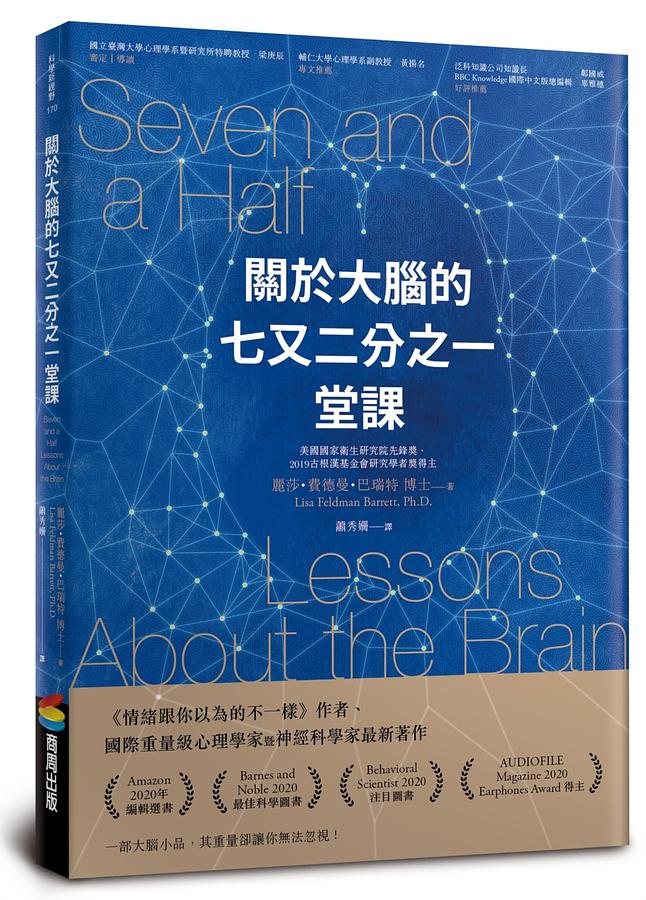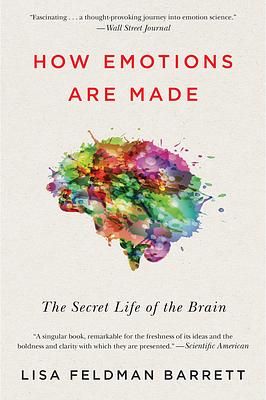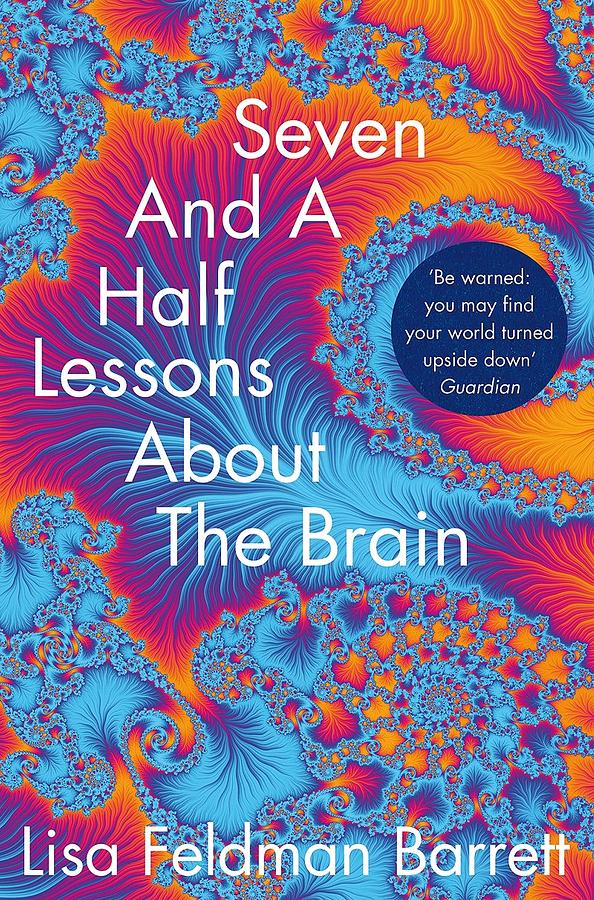How Emotions Are Made: The Secret Life of the Brain
情緒跟你以為的不一樣: 科學證據揭露喜怒哀樂如何生成
出版社:
出版日期:
2017/03/22
599
內容簡介
情緒不是天生而是你自己創造的,世界頂尖的神經科學家Lisa Feldman Barrett如是說。理解情緒的由來與本質,在未來的審判、醫療、警察執法等各方面,都對我們帶來極大的影響。
「《情緒如何產生》(How Emotions are Made)這本書,標示了情緒科學的典範移轉。除此之外,本書以一種清楚、非凡的寫作方式,巧妙地傳達出新的情緒神經科學。Lisa Barrett作品的影響(“只不過”是兩千年來人類對大腦的臆測)絕對是驚人的,更讓人驚訝的是她傑出的成就。」- Nancy Gertner (美國麻州地區法院前聯邦法官,哈佛法學院資深法律講師)
大部分的科學家都同意,情緒來自大腦特定區域,我們之所以感到不同的情緒,是因為環繞我們周遭的事物啟動該區域的緣故。所以我們看見老友感到興奮,看令人落淚的電影感到悲傷,失去摯愛感到害怕,這些感受都在我們體內自動且無法控制地升起,使我們臉部有不同表情並影響我們的行為。
這種對情緒的理解自亞里斯多德開始便有,但是,這樣的理解是正確的嗎?勇於開創的心理學家Lisa Feldman Barrett透過最新的科學證明顯示,我們對情緒的理解已經過時了,並且已經為此付出了代價。作者解釋,情緒並非像是內建於硬碟一般,天生地存於我們體內,而是根據我們個人在生理與環境的經歷所建構的心理經驗。
不管是法官對激動情緒所犯下罪行的判決,警察對嫌疑犯開槍,或者醫生在兩種診斷之間做選擇,這種對情緒做出的嶄新觀點,將對我們的未來產生很大的影響,對我們社會的幸福與健康至關重要。
When you feel anxious, angry, happy, or surprised, what's really going on inside you? Most scientists would agree that emotions come from specific parts of the brain, and that we feel them whenever they're triggered by the world around us. The thrill of seeing an old friend, the sadness of a tear-jerker movie, the fear of losing someone you love - each of these sensations arises automatically and uncontrollably within us, finding expression on our faces and in our behaviour, and carrying us away with the experience. This understanding of emotion has been around since Aristotle. But what if it's wrong? In How Your Emotions Are Made, pioneering psychologist Lisa Feldman Barrett draws on the latest scientific evidence to reveal that our ideas about emotion are dramatically, even dangerously, out of date - and that we have been paying the price. Emotions don't exist objectively in nature, Barrett explains, and they aren't pre-programmed in our brains and bodies; rather, they are psychological experiences that each of us constructs based on our unique personal history, physiology and environment. This new view of emotions has serious implications: when judges issue lesser sentences for crimes of passion, when police officers fire at threatening suspects, or when doctors choose between one diagnosis and another, they're all, in some way, relying on the ancient assumption that emotions are hardwired into our brains and bodies. Revising that conception of emotion isn't just good science, Barrett shows; it's vital to our wellbeing and the health of society itself.
「《情緒如何產生》(How Emotions are Made)這本書,標示了情緒科學的典範移轉。除此之外,本書以一種清楚、非凡的寫作方式,巧妙地傳達出新的情緒神經科學。Lisa Barrett作品的影響(“只不過”是兩千年來人類對大腦的臆測)絕對是驚人的,更讓人驚訝的是她傑出的成就。」- Nancy Gertner (美國麻州地區法院前聯邦法官,哈佛法學院資深法律講師)
大部分的科學家都同意,情緒來自大腦特定區域,我們之所以感到不同的情緒,是因為環繞我們周遭的事物啟動該區域的緣故。所以我們看見老友感到興奮,看令人落淚的電影感到悲傷,失去摯愛感到害怕,這些感受都在我們體內自動且無法控制地升起,使我們臉部有不同表情並影響我們的行為。
這種對情緒的理解自亞里斯多德開始便有,但是,這樣的理解是正確的嗎?勇於開創的心理學家Lisa Feldman Barrett透過最新的科學證明顯示,我們對情緒的理解已經過時了,並且已經為此付出了代價。作者解釋,情緒並非像是內建於硬碟一般,天生地存於我們體內,而是根據我們個人在生理與環境的經歷所建構的心理經驗。
不管是法官對激動情緒所犯下罪行的判決,警察對嫌疑犯開槍,或者醫生在兩種診斷之間做選擇,這種對情緒做出的嶄新觀點,將對我們的未來產生很大的影響,對我們社會的幸福與健康至關重要。
When you feel anxious, angry, happy, or surprised, what's really going on inside you? Most scientists would agree that emotions come from specific parts of the brain, and that we feel them whenever they're triggered by the world around us. The thrill of seeing an old friend, the sadness of a tear-jerker movie, the fear of losing someone you love - each of these sensations arises automatically and uncontrollably within us, finding expression on our faces and in our behaviour, and carrying us away with the experience. This understanding of emotion has been around since Aristotle. But what if it's wrong? In How Your Emotions Are Made, pioneering psychologist Lisa Feldman Barrett draws on the latest scientific evidence to reveal that our ideas about emotion are dramatically, even dangerously, out of date - and that we have been paying the price. Emotions don't exist objectively in nature, Barrett explains, and they aren't pre-programmed in our brains and bodies; rather, they are psychological experiences that each of us constructs based on our unique personal history, physiology and environment. This new view of emotions has serious implications: when judges issue lesser sentences for crimes of passion, when police officers fire at threatening suspects, or when doctors choose between one diagnosis and another, they're all, in some way, relying on the ancient assumption that emotions are hardwired into our brains and bodies. Revising that conception of emotion isn't just good science, Barrett shows; it's vital to our wellbeing and the health of society itself.
規格
誠品貨碼 / 2681406921007
ISBN13 / 9781509837502
ISBN10 / 1509837507
EAN貨碼 / 9781509837502
頁數 / 320
注音版 / 否
裝訂 / P:平裝
語言 / 3:英文
級別 / N:無
退貨說明
退貨須知:
- 依照消費者保護法的規定,您享有商品貨到次日起七天猶豫期(含例假日)的權益(請注意!猶豫期非試用期),辦理退貨之商品必須是全新狀態(不得有刮傷、破損、受潮)且需完整(包含全部商品、配件、原廠內外包裝、贈品及所有附隨文件或資料的完整性等)。
- 請您以送貨廠商使用之包裝紙箱將退貨商品包裝妥當,若原紙箱已遺失,請另使用其他紙箱包覆於商品原廠包裝之外,切勿直接於原廠包裝上黏貼紙張或書寫文字。若原廠包裝損毀將可能被認定為已逾越檢查商品之必要程度,本公司得依毀損程度扣除回復原狀必要費用(整新費)後退費;請您先確認商品正確、外觀可接受,再行拆封,以免影響您的權利;若為產品瑕疵,本公司接受退貨。
依「通訊交易解除權合理例外情事適用準則」,下列商品不適用七日猶豫期,除產品本身有瑕疵外,不接受退貨:
- 易於腐敗、保存期限較短或解約時即將逾期。(如:生鮮蔬果、乳製品、冷凍冷藏食材、蛋糕)
- 依消費者要求所為之客製化給付。(如:客製印章、鋼筆刻字)
- 報紙、期刊或雜誌。
- 經消費者拆封之影音商品或電腦軟體。
- 非以有形媒介提供之數位內容或一經提供即為完成之線上服務,經消費者事先同意始提供。(如:電子書)
- 已拆封之個人衛生用品。(如:內衣褲、襪類、褲襪、刮鬍刀、除毛刀等貼身用品)
- 國際航空客運服務。
若您退貨時有下列情形,可能被認定已逾越檢查商品之必要程度而須負擔為回復原狀必要費用(整新費),或影響您的退貨權利,請您在拆封前決定是否要退貨:
- 以數位或電磁紀錄形式儲存或著作權相關之商品(包含但不限於CD、VCD、DVD、電腦軟體等) 包裝已拆封者(除運送用之包裝以外)。
- 耗材(包含但不限於墨水匣、碳粉匣、紙張、筆類墨水、清潔劑補充包等)之商品包裝已拆封者(除運送用之包裝以外)。
- 衣飾鞋類/寢具/織品(包含但不限於衣褲、鞋子、襪子、泳裝、床單、被套、填充玩具)或之商品缺件(含購買商品、附件、內外包裝、贈品等)或經剪標或下水或商品有不可回復之髒污或磨損痕跡。
- 食品、美容/保養用品、內衣褲等消耗性或個人衛生用品、商品銷售頁面上特別載明之商品已拆封者(除運送用之包裝外一切包裝、包括但不限於瓶蓋、封口、封膜等接觸商品內容之包裝部分)或已非全新狀態(外觀有刮傷、破損、受潮等)與包裝不完整(缺少商品、附件、原廠外盒、保護袋、配件紙箱、保麗龍、隨貨文件、贈品等)。
- 家電、3C、畫作、電子閱讀器等商品,除商品本身有瑕疵外,退回之商品已拆封(除運送用之包裝外一切包裝、包括但不限於封膜等接觸商品內容之包裝部分、移除封條、拆除吊牌、拆除貼膠或標籤等情形)或已非全新狀態(外觀有刮傷、破損、受潮等)與包裝不完整(缺少商品、附件、原廠外盒、保護袋、配件紙箱、保麗龍、隨貨文件、贈品等)。
- 退貨程序請參閱【客服專區→常見問題→誠品線上退貨退款】之說明。
付款/配送










